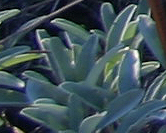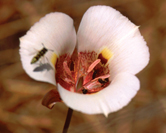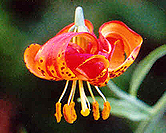Winter/Spring Botanic Garden Class Details 2012



To enroll, print out the Class Registration Form and send it with your check to:
John Rusk, 1354-B Lincoln St., Berkeley, CA 94702.
For additional information call John Rusk at 510-528-0526 or email at john@rusk.com.
(Advance registration is required for all classes. Drops in are not permitted.)
Exploring the Edible Native Plants of California
In this course, we’ll have a fun time identifying, collecting, preparing, and growing California native edibles. Included will be field trips, brainstorming ideas on recipes for preparing dishes adapted to our palettes, lectures with slides, walks in the Garden, and hands-on methods of propagating the plants. While most sessions will meet at the garden, there will be field trips on several dates. At the first class meeting, we’ll go over dates and destinations for field trips, which will include driving trips and hikes of up to four or five miles. Each participant will choose a plant or two to experiment with in the kitchen and a plant or two to grow. At the end of the course, we'll combine what we've learned and perhaps taste some of our efforts.
Attendance at the first session is strongly urged, since that’s when we will organize the class schedule for the following weeks and allow participants to choose take-home projects.
Ten Sundays, 10 am-1 pm (field trips will be longer): February 19 and 26; March 11 and 25; April 1, 22, and 29 (field trip) ; May 6, 13 (field trip), and 20
Instructor: Glenn Keator
Location: Visitor Center, Regional Parks Botanic Garden; field trip locations to be announced
$250 entire series/$30 each session
Learning to Key with The Jepson Manual
Transitioning from a wildflower guide to a technical flora with dichotomous keys can be an intimidating experience. In California our go-to flora for the identification of wildland flowers is The Jepson Manual. This two-day course will help participants become familiar with this tome of botanical information in both classroom and field settings. Topics covered in the course include an overview of botanical terminology; navigating dichotomous keys; understanding species descriptions, ranges, and habitats; and applying what we have learned in the field. The first day will be spent in the classroom and in the garden. The second day will be spent at a field site in the Mt. Diablo area.
Saturday-Sunday, March 10-11, 9 am-4 pm
Instructor: Heath Bartosh
Location: Saturday-Visitor Center, Regional Parks Botanic Garden; Sunday-field trip location to be announced
Required materials: 10x hand lens, The Jepson Manual (2nd edition, available from UC Press: ucpress.edu). Please bring lunch
$100 members / $110 nonmembers (for both days)
Botanizing California: Windy Hill Preserve
If you've ever traveled Skyline along the crest of the mountains in the Peninsula, you've encountered wind, so it's no surprise this area's name refers to that common force. Windy Hill encompasses a steep ridgeline that plunges hundreds of feet to Portola Valley on the bay side of the mountains. Starting in coastal scrub and prairie, trails snake down slopes dominated by huge Douglas-firs, tan oaks, and madrones, and a fine stand of western leatherwood (Dirca occidentalis) vies for attention in early spring with hound's tongue, giant trillium, Indian warrior, and many other woodland flowers. Our hike will be around four miles of up and down walking. Be prepared for steep slopes and some deep shade.
Saturday, March 31, 10 am-2:30 pm
Instructor: Glenn Keator
Location: Meet at the preserve's main parking lot on Skyline Boulevard above Woodside (driving directions will be provided upon registration)
Please bring lunch
$50 members / $60 nonmembers
Emerging Botanical Field Methods: New Technologies to Explore Wild Diversity
Recent years have seen a burst of innovation in tools that give professional botanists and amateur naturalists new ability to identify plants in the field, precisely map plants, report beautiful or important discoveries, and explore diversity and distribution from mountaintop, desktop, or laptop. This training workshop will introduce participants to the diversity of technical tools available for exploring California's botanical diversity and focus on those few that are really valuable, really easy, and add rather than detract from our field experience. We will provide enough iPhones, Android phones, tablets, and GPS cameras to ensure that every attendee has the chance to get "hands on" in the garden and familiar with using these tools. All workshop attendees will receive a free 12-month registration to Calflora. By the end of this class you'll be ready for your best spring wildflower season ever!
Saturday, March 24, 1-4 pm
Instructor: Daniel Gluesenkamp
Location: Visitor Center, Regional Parks Botanic Garden
$75 members / $80 nonmembers
Taxonomy Workshop: The Genus Ceanothus
Ceanothus (wild lilac, buckbrush, deer brush, and more) is among our premier native shrub genera, widely used in gardens, renowned for its spring floral displays, useful for its fragrances and saponin compounds, and diverse in its forms and habitats. The genus ranges from low, woody, evergreen ground covers on coastal bluffs to treelike shrubs on the Channel Islands, medium sized evergreen and deciduous shrubs at all elevations in the foothills and mountains, and occasional outliers in the high desert. You'll learn about thorny species, white- and pink-flowered species, holly-leafed species, and species with heavily fragrant leaves. You'll also find useful ways of telling species apart, from the many Bay Area members to species from the Sierra and mountains of Southern California. You'll be introduced to the genus through a series of photos and specimens followed by a walk through the garden to view our extensive and varied collection from all over the state.
Sunday, April 15, 10 am-3 pm
Instructor: Glenn Keator
Location: Visitor Center, Regional Parks Botanic Garden
Please bring lunch
$50 members / $60 nonmembers
Making Natives Look Good in the Garden: Design Tips from a Garden Photographer
In this morning presentation, professional garden photographer Saxon Holt will show examples of mature native plants in garden settings that are both attractive and functional. A native plant gardener himself, long-time member of CNPS, and advocate for authentic images in garden media, Saxon will suggest plant-driven design ideas that look good in the garden-and in the camera.
Saturday, April 28, 10 am-12 pm
Instructor: Saxon Holt
Location: Visitor Center, Regional Parks Botanic Garden
$30 members / $35 nonmembers
The Beauty of Natives: Photography Tips from a Garden Photographer
In this hands-on class for those who want to improve their photography, professional garden photographer Saxon Holt will begin with visualization exercises in the garden designed to help find the best scenes to photograph. Next will be a classroom presentation, "Making Natives Look Good in the Garden," emphasizing photographic technique (the April 28 session will emphasize garden design). We will finish with photography and personal instruction in the garden (bring your camera). An on-line critique of student images is offered as a follow-up.
Sunday, April 29, 10 am-4pm
Instructor: Saxon Holt
Location: Visitor Center, Regional Parks Botanic Garden
Equipment list will be provided upon registration
Please bring lunch
$100 members / $110 nonmembers
Botanizing California: Serpentine Outcrops on the Tiburon Peninsula Class full
This outing will feature the plants endemic to or favoring serpentine rocks-rocks that result in soil low in calcium and high in magnesium and heavy metals. We'll start on Ring Mountain in non-serpentine soils with a variety of shrubs and grassland plants including calochortuses, brodiaeas and their relatives, suncups, Douglas iris, and more, then climb switchbacks to the serpentine-capped top with views of San Francisco. Here among fields of tidy tips, poppies, and goldfields, we'll look for jewels such as the Tiburon mariposa (Calochortus tiburonensis) and Marin dwarf flax (Hesperolinon congestum). After lunch, we'll drive on to Tiburon and visit a second serpentine area around the historic old St. Hilary's Church. This area features the rare black jewelflower (Streptanthus niger) and the odd combination of a wet seep on serpentine, home to leopard lily, long-rayed brodiaea, and several other intriguing plants. The hike on Ring Mountain is around two miles round trip; there's minimal walking at St. Hilary's Church.
Saturday, May 19, 10 am-3 pm
Instructor: Glenn Keator
Location: Meet at the bottom trailhead for Ring Mountain
(driving directions will be provided upon registration)
Please bring lunch
$50 members / $60 nonmembers
Identifying and Appreciating the Native and Naturalized Grasses of California
Grasses are fun and easy to identify. Our goal in this class for beginners is to learn basic skills for identifying grasses. On Day 1 we'll learn about California's grassland ecology and the qualities of specific native grasses for restoration. We will become skilled at recognizing the basic groups and common species through working with plant samples in the classroom and exploring the garden's collection, reviewing both the old "tribe" method of identifying grasses as well as the artificial key methodology focusing on important distinguishing traits. On Day 2 we'll explore the native and naturalized grasses of Point Reyes and make use of our new understanding and skills. A valuable class binder with basic keys will be provided.
Saturday-Sunday, May 26-27, 8:30 am-4 pm
Instructor: David Amme
Location: Saturday-Visitor Center, Regional Parks Botanic Garden; Sunday-Point Reyes National Seashore
Driving directions and equipment list will be provided upon registration
Please bring lunch
$150 members / $160 nonmembers (for both days)
Native Botanicals: Field Studies in Drawing and Design
Native flora will be our inspiration for drawing and design studies using pencil, ink, and gouache. Projects will include field-friendly ways to render positive/negative space, repeating surface design, gesture, form, and detail, and ways to explore your own creative response and mark with authenticity. You'll end the day with deeper understanding of sound principles of design and a beautiful collection of studies to refer to for future inspiration!
Saturday, June 2, 9:30 am-4 pm
Instructor: Andie Thrams
Location: Visitor Center, Regional Parks Botanic Garden
Supplies list will be provided upon registration
Please bring lunch
$120 members / $130 nonmembers
Native Botanicals: Field Studies in Watercolor
The Botanic Garden's flora will invite a sequence of meditative watercolor studies designed to evoke the magic of early summer in your painting. Our work will include using watercolor and gouache to mix colors and create beautiful shimmering surfaces, explore value, and use layers of color with wet into wet and glazing techniques. You'll carry away a series of studies that conjure up the complexity of wild flora and inspire future painting in the field.
Sunday, June 3, 9:30 am-4 pm
Instructor: Andie Thrams
Location: Visitor Center, Regional Parks Botanic Garden
Supplies list will be provided upon registration
Please bring lunch
$120 members / $130 nonmembers
Fast Times on Planet Earth: Invasive Species
Invasive turkeys! Sudden Oak Death! West Nile Virus and swine flu! Biological invasions are a phenomenon of growing importance. Through this workshop, attendees will gain a clear and rational picture of how invasions fit into earth's history and evolution, will learn when we should and shouldn't care about invaders, and will better understand identification and control techniques for common invasive species. The workshop will start at the Botanic Garden with an overview of the biological invasion crisis, lessons in identifying several important invasive plant species, and information about the Bay Area Early Detection Network (BAEDN), designed to minimize the environmental and economic damage caused by invaders. Then, on a moderate hike of 2-3 miles in Tilden Park's Wildcat Gorge, we will identify common and rare invasive species, learn how they interact with native plants and habitats, and talk about control options. Dan will bring a great selection of smart phones and GPS cameras with Calflora's new applications installed, and anyone interested will be given the chance to use these exciting tools to map invasive and native plants in the field. All workshop attendees will receive a free registration to Calflora with which they can view their mapped plants and photos online after the workshop has ended.
Saturday, June 9, 10 am-3 pm
Instructor: Daniel Gluesenkamp
Location: Visitor Center, Regional Parks Botanic Garden, and Tilden Park
Please bring lunch
$60 members / $65 nonmembers